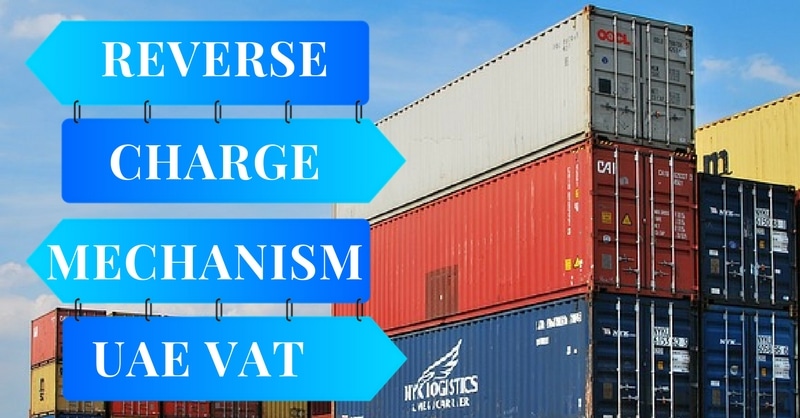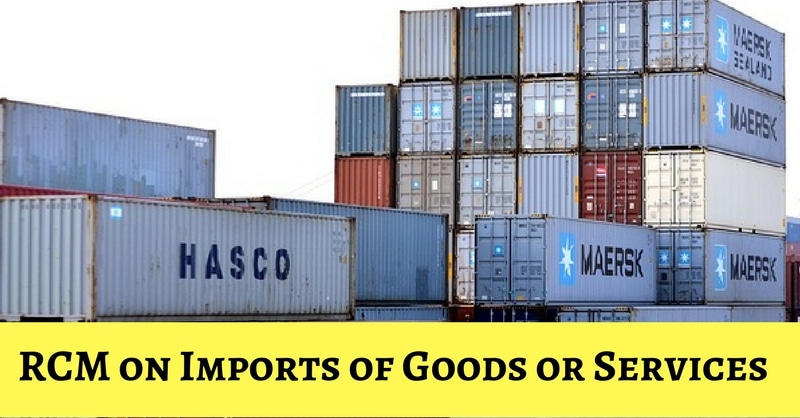
The UAE VAT Law will be introduced and implemented across UAE on 01st January 2018 at a flat rate of 5%. Let us understand UAE VAT Reverse Charge Mechanism.
Usually, the VAT liability is to be discharged by the supplier of goods/ service or both.
However, in specific cases, the liability to pay tax is applicable on the recipient of the supply instead of the supplier. This is known as UAE VAT Reverse Charge Mechanism (RCM).
According to Article 48 of VAT Law, in cases where the taxable person imports concerned goods or concerned services for the purposes of his business, then he shall be treated as making a taxable supply to himself. He shall be responsible for all applicable taxes.
The Executive Regulation shall specify conditions and instances where UAE VAT Reverse Charge Mechanism applies and additional obligations related to record keeping for tax calculated according to the RCM.

Article – 48: UAE VAT Reverse Charge Mechanism
1. If the Taxable Person imports Concerned Goods or Concerned Services for the purposes of his Business, then he shall be treated as making a Taxable Supply to himself and shall be responsible for all applicable Tax obligations and be accounting for Due Tax in respect of these supplies.
2. As an exception to Clause (1) of this Article, in case the final destination of the Goods when entering the State is another Implementing State, the Taxable Person shall pay the Due Tax on Import of Concerned Goods pursuant to the mechanism specified by the Executive Regulation of this Decree-Law.
3. If a Registrant makes a Taxable Supply in the State to another Registrant of any crude or refined oil, unprocessed or processed natural gas, or any hydrocarbons, and the Recipient of these Goods intends to either resell the purchased Goods as crude or refined oil, unprocessed or processed natural gas, or any hydrocarbons, or use these Goods to produce or distribute any form of energy, the following rules shall apply:
a. The Registrant making the Supply shall not charge Tax on the value of the supply of the Goods referred to in this paragraph.
b. The Recipient of the Goods shall calculate the Tax on the value of the Goods supplied thereto and shall be responsible for all applicable Tax obligations and for calculating the Due Tax in respect of such supplies.
4. The provisions of Clause (3) of this Article shall not apply in any of the following situations:
a. Where, before the Date of Supply, the Recipient of Goods has not provided a written confirmation to the supplier that his acquisition of the Goods is for the purpose of resale.
b. Where, before the Date of Supply, the Recipient of Goods has not provided a written confirmation to the supplier that he is a Registrant and the supplier has not verified the Tax Registration of the Recipient of Goods by means approved by the Authority.
c. Where the Taxable Supply would be subject to Tax at the rate of 0% in accordance with Clause (1) of Article (45) of this Decree-Law.
d. Where the Taxable Supply includes a supply of Goods or Services other than the Goods referred to in Clause (3) of this Article.
5. Where a Recipient of Goods of any crude or refined oil, unprocessed or processed natural gas, or any hydrocarbons confirms in writing to the supplier that he is a Registrant for the purposes of applying Clause (3) of this Article, the following shall apply:
a. The supplier shall not be liable for calculating the Tax in relation to the supply unless he was aware or supposed to be aware, that the Recipient was not a Registrant at the Date of Supply.
b. The Recipient shall be liable for the calculation of any Due Tax in respect of the supply.
6. If the supplier mentioned in paragraph (a) of Clause (5) of this Article is supposed to be aware that the Recipient of Goods was not registered at the Date of Supply, the supplier and the Recipient of Goods shall be jointly and severely liable for any Due Tax and relevant penalties in respect of the supply.
7. The Executive Regulation of this Decree-Law shall specify:
a. Conditions and instances where the mechanism in Clause (1) of this Article applies.
b. Additional obligations related to record keeping for Tax calculated according to the mechanism in Clause (1) of this Article.
To know more about the VAT you can visit the official website of Ministry of Finance – UAE www.mof.gov.ae
You can download other accounting templates like UAE VAT Invoice Template, UAE Invoice Template in Arabic, and Cash Book with VAT from here.
We thank our readers for liking, sharing and following us on different social media platforms.
If you have any queries please share in the comment section below. We will be more than happy to assist you.